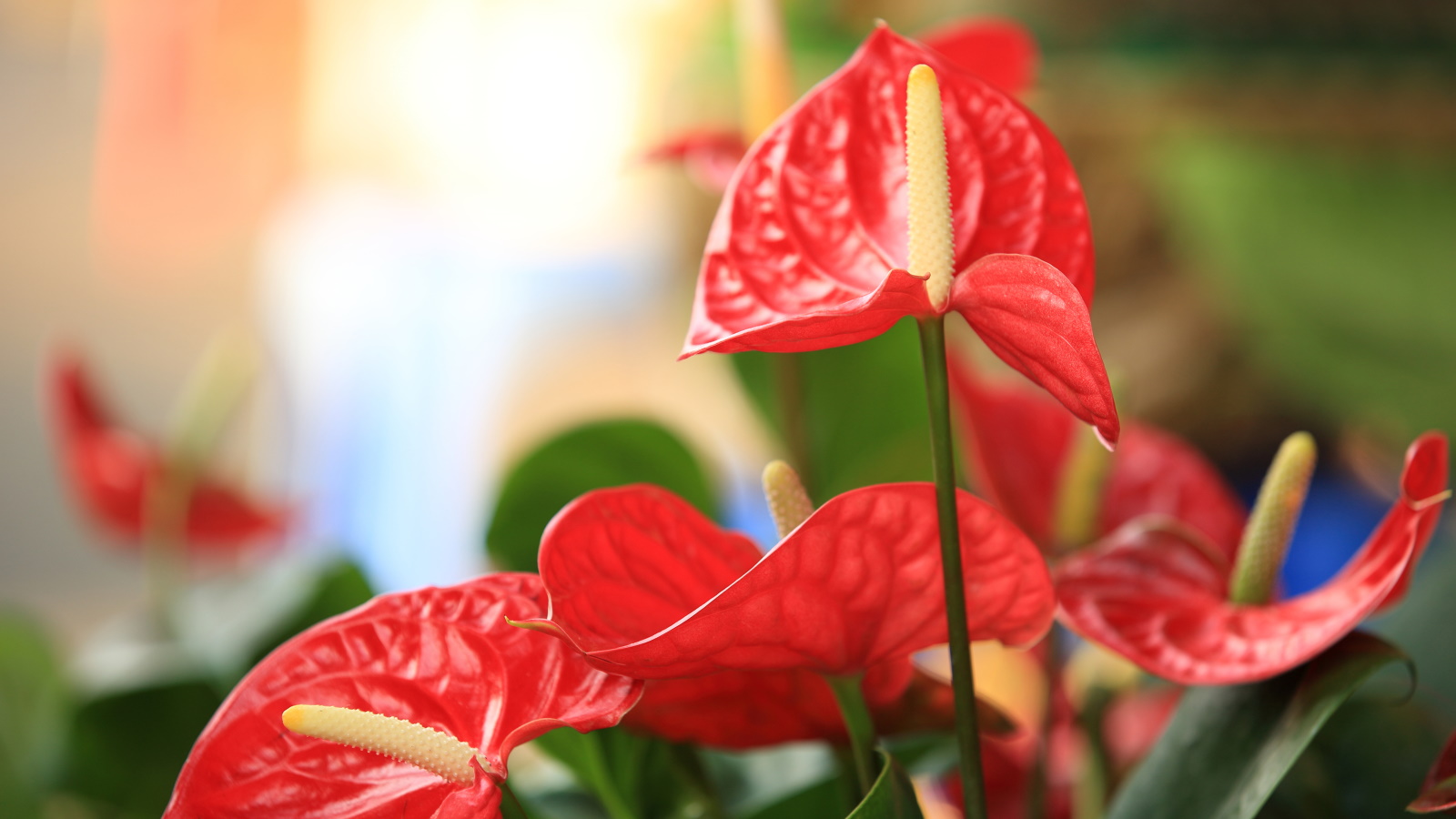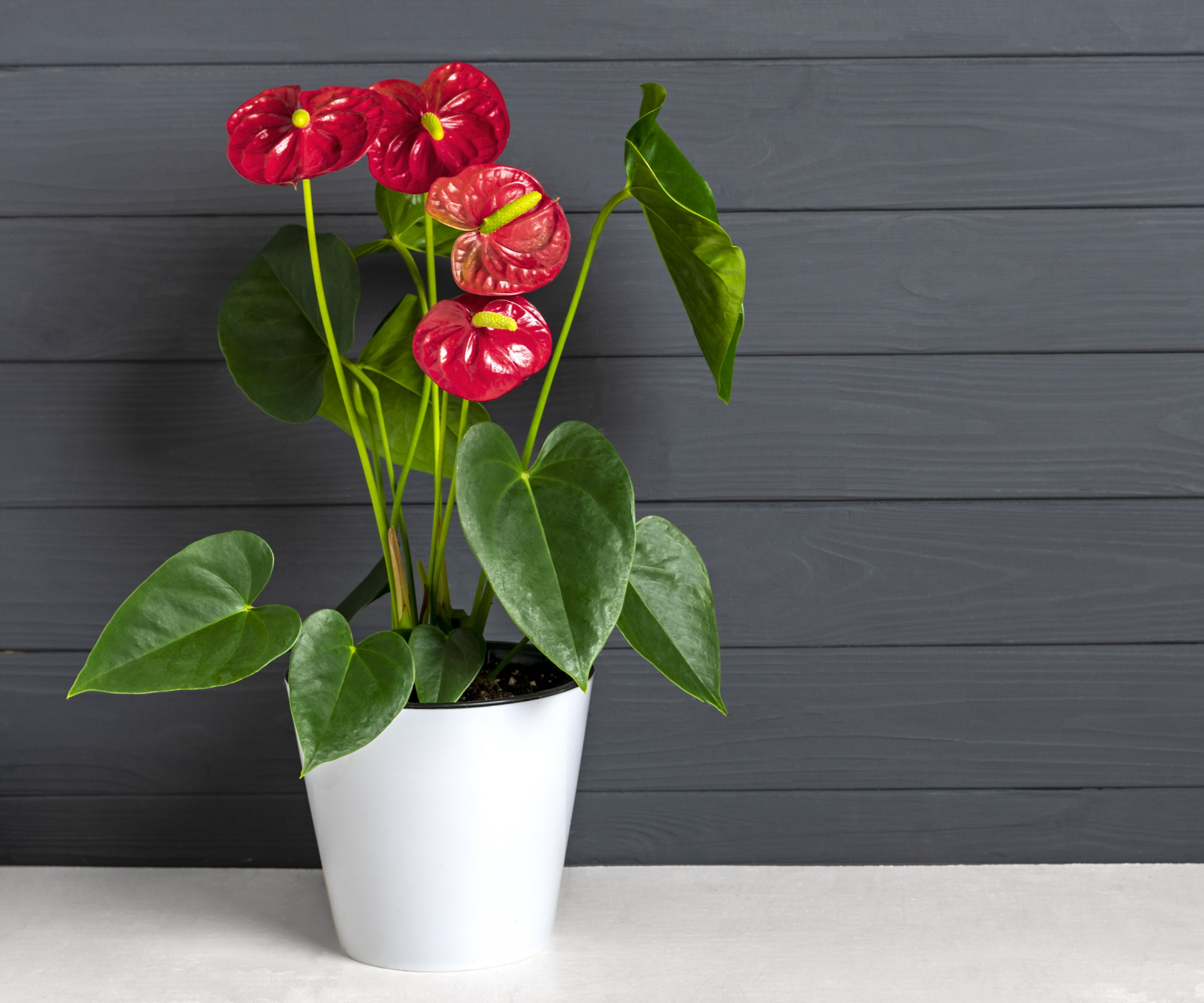How to get an anthurium to bloom again – and keep it flowering for longer
With just some essential care you'll have vibrant flowers brightening your home once again


Design expertise in your inbox – from inspiring decorating ideas and beautiful celebrity homes to practical gardening advice and shopping round-ups.
You are now subscribed
Your newsletter sign-up was successful
Want to add more newsletters?

Twice a week
Homes&Gardens
The ultimate interior design resource from the world's leading experts - discover inspiring decorating ideas, color scheming know-how, garden inspiration and shopping expertise.

Once a week
In The Loop from Next In Design
Members of the Next in Design Circle will receive In the Loop, our weekly email filled with trade news, names to know and spotlight moments. Together we’re building a brighter design future.

Twice a week
Cucina
Whether you’re passionate about hosting exquisite dinners, experimenting with culinary trends, or perfecting your kitchen's design with timeless elegance and innovative functionality, this newsletter is here to inspire
A beautiful flowering plant such as an anthurium can take your indoor plant collection to the next level, their eye-catching flowers can add beautiful pops of color to your home, and they make attractive centerpieces.
Exploring anthurium care and growing tips can provide you with one of the best indoor plants that flower all year round. Loved for their vibrant color and waxy, flower-like modified leaves called spathes, these iconic red houseplants can bring unique visual interest to your inside space.
Anthurium blooms often last for months at a time, and it can be disheartening when they eventually fade away. But don't fret, it is possible to encourage your anthurium to rebloom – and we've asked experts how best to achieve this.
What causes an anthurium to stop blooming?

There are a few reasons your anthurium might have stopped blooming. They go through a natural flowering cycle and the spathes will die after several months. However, if you notice that the spathes aren't returning, it may be an indication that your plant has improper growing conditions.
'Unsuitable watering, improper lighting and infrequent repotting can cause an anthurium to stop blooming,' says Nastya Vasylchyshyna, botany expert at Plantum.
It's important to provide your anthurium with lots of bright, indirect light, and you should allow it to dry around 50% before watering again. Failing to do so could hinder the health of your plant and prevent new spathes from growing.
'Insufficient nutrition, brought on by a lack of regular feeding and depleted substrates, tends to be the most common factor,' says Nastya.
Design expertise in your inbox – from inspiring decorating ideas and beautiful celebrity homes to practical gardening advice and shopping round-ups.
Anthuriums appreciate a balanced fertilizer, like this liquid plant food from Garden Goods Direct, to keep their modified foliage bright and thriving. However, take care not to fertilize anthurium too much as it could cause a build-up of excess salt.

Nastya Vasylchyshyna is a professional botany expert for the Plantum app that helps identify plants and plant diseases and provides care recommendations. For 4 years she has consulted on botany-related topics for Plantum. Her specialization is plant morphology, phytopathology, and plant physiology.
How do you get an anthurium to bloom again?

The first thing you need to do to get your anthurium to produce its beautiful spathes again is assess its growing conditions.
'Anthuriums require bright, indirect light to bloom again. Avoid direct light, as that will lead to sunburned foliage and flowers,' says Julie Bawden Davis, indoor plant expert at Healthy Houseplants.
'You should also fertilize from spring to fall with a fertilizer high in phosphorus, which will promote blooming. Fertilize with a half-strength solution, as anthuriums can be damaged by too much fertilizer,' Julie adds.
You should always take care to water houseplants correctly if you want to encourage new growth.
'Tie your watering to the rate at which the top layer of the potting mix dries off – both letting the substrate dry out completely and watering it to the point of sogginess will be stressful to the plant,' says Natsya.
Using a planter with drainage holes, like these planters from Amazon, can help to collect and remove excess water from your anthurium. You can likewise use a well-draining potting mix for your anthurium to reduce the risk of waterlogged soil.
Julie notes you should also repot your anthurium regularly. 'Pot up anthuriums on a regular basis, as crowded roots can slow down or stop flowering,' she says.
'Anthuriums thrive in high humidity. You can boost it by either misting the plant regularly or placing a humidifier by the pot. Use lukewarm, settled, soft water for both watering and misting,' says Natsya. You can increase humidity for houseplants in several ways, such as using this mister from Amazon or this humidifier from Amazon.
'During the active growing period, the optimal temperature range for your anthurium will be 70–81°F. Protect it from cold drafts and don’t place it next to any heaters or AC,' says Nastya. 'Providing anthuriums with a period of rest will increase the chances of it blooming again. As soon as the plant finishes flowering, start lowering the growing temperature by 9–13°F each day to a minimum of 61–63°F ,' she adds.

Julie Bawden-Davis is a garden author and University of California Certified Master Gardener, who has written several gardening books, including Indoor Gardening The Organic Way. In addition to running HealthyHouseplants.com, she shares indoor gardening advice on her YouTube channel @HealthyHouseplants.
FAQs
Should I prune my anthurium?
Anthuriums are beautiful indoor plants that produce bright modified leaves called spathes. It's a good idea to prune the dead foliage away once it finishes 'blooming' to encourage new growth. With optimal growing conditions, you will see your anthurium produce its vibrant spathes once again.
Anthuriums are a great choice if you're after an indoor plant that will flower for a long time, and with the right care you can encourage new growth again. You can even try propagating an anthurium to multiply your plants.
Discover other houseplants with heart-shaped leaves to grow more statement plants in your home.

Tenielle is a Gardens Content Editor at Homes & Gardens. She holds a qualification in MA Magazine Journalism and has over six years of journalistic experience. Before coming to Homes & Gardens, Tenielle was in the editorial department at the Royal Horticultural Society and worked on The Garden magazine. As our in-house houseplant expert, Tenielle writes on a range of solutions to houseplant problems, as well as other 'how to' guides, inspiring garden projects, and the latest gardening news. When she isn't writing, Tenielle can be found propagating her ever-growing collection of indoor plants, helping others overcome common houseplant pests and diseases, volunteering at a local gardening club, and attending gardening workshops, like a composting masterclass.